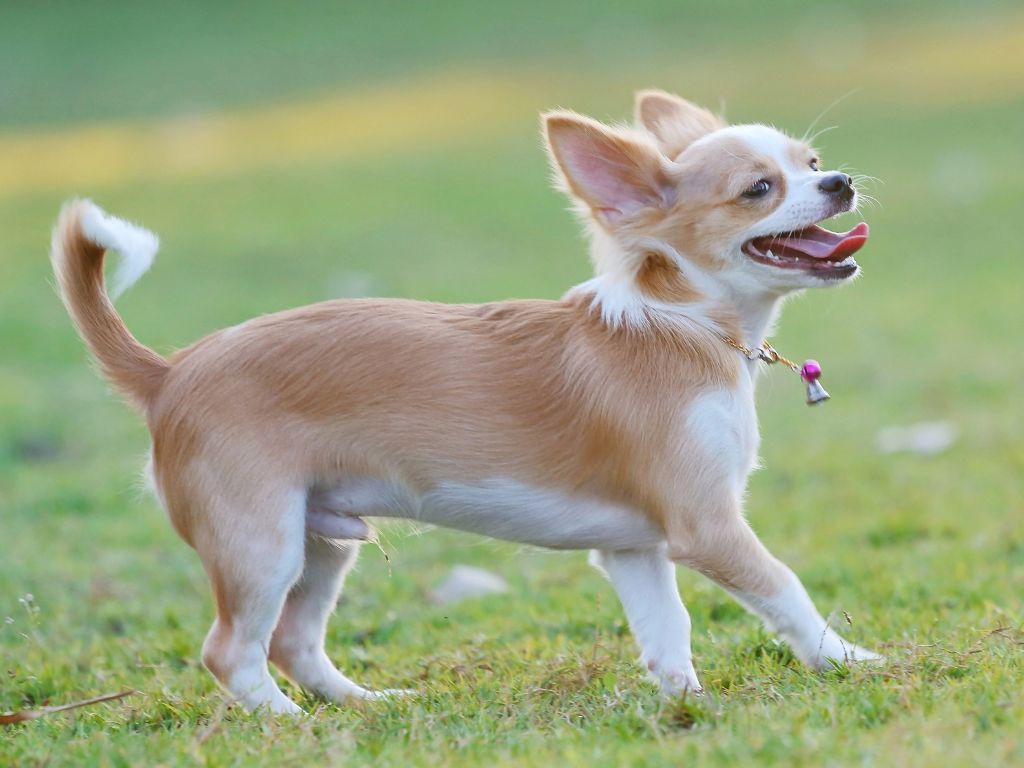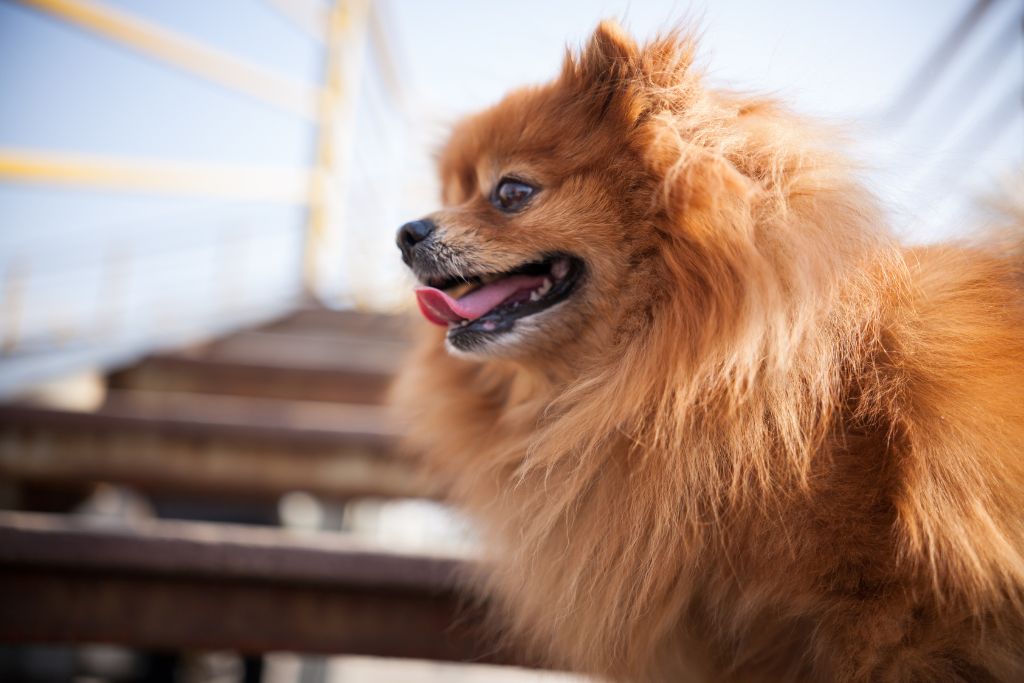collapsed trachea support


free shipping over $100 (USA & Canada)
1-877-937-4372 the pet expert hotline

Coughing and shortness of breath are some of the uncomfortable symptoms related to collapsing trachea in dogs. If you have a pup showing these signs, we can help you better understand this condition and ways to provide the best care for your little one. Smaller dogs are more genetically prone to collapsed trachea. Still, any pet can suffer from this condition, so let’s discuss the clinical signs, diagnostic tests, treatment options, and natural supplements so you know how to support your little one.
The trachea is the windpipe that allows air to pass in and out of your little one’s lungs. Collapsing trachea is a condition where the cartilage rings of the trachea, which normally provide structural support, weaken or collapse. With that, when the trachea collapses, it can lead to breathing difficulties and discomfort for our canine companions.
There is not a single cause for collapsing trachea in dogs. However, it is believed to be a combination of genetic predisposition and environmental factors. Smaller breeds, such as Chihuahuas, Pomeranians, and Yorkshire Terriers, are more prone to this condition. Other contributing factors may include obesity, respiratory infections, allergies, or irritants.
The clinical signs of tracheal collapse can vary but commonly include:
If you notice any of these signs in your dog, it’s essential to consult with your veterinarian for a proper diagnosis and treatment plan.
To diagnose tracheal collapse, your veterinarian may perform several diagnostic tests, including:
These tests will aid in confirming the diagnosis and determining the appropriate treatment approach.

The treatment options for collapsing trachea depend on the severity of the condition. Mild cases may be managed with lifestyle modifications, medication, and supplements to control symptoms, with cough suppressants or bronchodilators properties. More severe cases may require surgical intervention, such as tracheal stenting or surgical reconstruction of the trachea. Your veterinarian will guide you in selecting the most suitable treatment plan for your dog’s specific situation.
Taking care of a dog with tracheal collapse involves several essential steps:
Supplements can play a supportive role in managing tracheal collapse in dogs. Here are a few of our vet-formulated blends that can help:
NHV Resp-Aid: Helps support lungs that are in distress due to tracheal collapse and contains herbs with natural anti-inflammatory properties. It can assist with respiratory congestion, aid the body in fighting infection, and may help with shortness of breath.
NHV Lesstress: Periods of excitement can result in severe respiratory distress. Lesstress is a natural, safe, herbal formulation that can help calm your dog or cat. It supports both the nervous system and the immune system.
NHV Turmeric: The active compound in turmeric is Curcumin, which has anti-inflammatory properties. The anti-inflammatory properties of this herb may be useful to help with the inflammation of the lining of the trachea. Turmeric also supports heart and circulatory functions and has discomfort-reducing properties.
NHV PetOmega 3: Omega 3 oils help promote healthy heart function and support lungs that may be affected by a collapsed trachea. PetOmega 3 promotes overall support and comfort and may even help regenerate the tissues of the cartilage rings, according to some studies.
All four vet-formulated supplements are found in the NHV Collapsed Trachea Super Support bundle at a discounted price.
collapsed trachea support


Resp-Aid, Lesstress, Turmeric & PetOmega 3
bundle and save with pet expert kits
3 month supply for a small to medium size
NHV's all natural, vet-formulated Tracheal Collapse Support bundle for pets helps relieve symptoms of tracheal collapse in dogs and other pets. Each supplement works synergistically in your pet’s body to balance the immune system and support the respiratory and circulatory tracts that might be compromised due to this condition.

NHV's all natural, vet-formulated Tracheal Collapse Support bundle for pets helps relieve symptoms of tracheal collapse in dogs and other pets. Each supplement works synergistically in your pet’s body to balance the immune system and support the respiratory and circulatory tracts that might be compromised due to this condition.
Tracheal Collapse Support for Pets
Tracheal collapse is an acquired, non- congenital, disease. It can occur in the neck region, within the chest, where the trachea is located, or in both locations. The cartilage rings of the trachea (windpipe) are shaped like the letter C, lying on its back. A small membrane covers the top of the ring. The cartilages loses its rigidity, and the membrane stretches. For this reason, the rings may be collapsed, the windpipe flattened, and mild to severe obstruction of the airway may develop.
The cause is not well understood, but proposed theories include genetic factors such as breed, nutritional influences, neurologic problems, and degeneration of the tracheal cartilages.
Symptoms of Tracheal Collapse in Dogs and Cats
A Powerful Complete Kit
The herbs present in each of these formulations have anti-inflammatory and antioxidant properties and help support the symptoms of pets suffering from a collapsed trachea, like shortness of breath, stress, discomfort, inflammation and discomfort caused by it.
NHV’s Tracheal Collapse Support Kit is a vet formulated bundle with 4 all-natural herbal blends designed to support a pet suffering from collapsed trachea. NHV’s Resp-Aid, NHV’s Lesstress, NHV’s Turmeric and NHV’s PetOmega 3, are combined in this bundle to help relieve symptoms of tracheal collapse and balance your pet’s immune system.
If you have questions about holistic remedies, you can ask an expert at NHV because we want your pet to get healthy naturally.
Select your pet's weight to determine the correct dose.
Resp-Aid: Resp-Aid is an anti-inflammatory, antibiotic, and healing formulation that helps with upper respiratory congestion helps fight infection and relieves shortness of breath. As tracheal collapse is an anatomic issue Resp Aid can be helpful to help the lungs and trachea that are in distress in this situation.
Coltsfoot — Helps to control coughing and is a natural expectorant.
Ginger — Relieves discomfort and stimulates circulation.
Horehound — Relieves spasms and aids with cough and mucus
Licorice — A fast-acting versatile herb that helps support many respiratory ailments.
Lobelia — A potent herb that causes the immediate relaxation and expansion of the respiratory system allowing oxygenated blood to flow freely.
Marshmallow — Helps control bacterial infections and soothes irritated tissues
Mullein — Soothes and lubricates tissue
Myrrh — A stimulant that relieves spasms, inflammation, and digestive upset.
Plantain — An expectorant that soothes and lubricates internal mucous membranes.
Lesstress: As some pets can benefit from the use of relaxants during periods of excitement, since excitement may result in severe respiratory distress. Lesstress, a natural herbal formulation designed to calm and relax a pet, can be helpful. It is an herbal formulation that acts on the nervous and immune systems, calming anxiety.
Chamomile – Has analgesic and sedative properties.
Passionflower – Contains alkaloids and flavonoids, two effective sedatives.
Lemon Balm – A relaxing tonic with a sedating effect.
Reishi – A herb with sedative properties that boosts heart and liver function and stimulates the immune system.
Eleuthero – A tonic with a modulating effect on your dog’s major stress axis including the pituitary glands, the hypothalamus, and the adrenal glands. It also helps dogs develop a healthy resistance to stress.
Echinacea Angustifolia – Contains powerful immune-stimulating properties.
Turmeric: Turmeric has anti-inflammatory properties and may be used to help reduce the inflammation of the lining of the trachea.
Curcumin - Studies have shown turmeric to be an excellent anti-inflammatory, antioxidant, antifungal, antibacterial, anticoagulant, antiseptic, astringent, helps with liver function, bile production and externally for wound healing
PetOmega 3: A daily supplement to enhance overall health and wellbeing. Omega-3 fatty acids will be helpful in supporting cardiac health and his lungs that may be affected by the collapsed trachea.
Fish Oil (Anchovy and Sardine) and Cod Liver Oil - The Eicosatetraenoic acid (EPA) and docosahexaenoic acid (DHA) are omega-3 fatty acids found in fish oils and they help support heart function and immune system as well as reduce inflammation.
Tracheal Collapse Support for Pets
Tracheal collapse is an acquired, non- congenital, disease. It can occur in the neck region, within the chest, where the trachea is located, or in both locations. The cartilage rings of the trachea (windpipe) are shaped like the letter C, lying on its back. A small membrane covers the top of the ring. The cartilages loses its rigidity, and the membrane stretches. For this reason, the rings may be collapsed, the windpipe flattened, and mild to severe obstruction of the airway may develop.
The cause is not well understood, but proposed theories include genetic factors such as breed, nutritional influences, neurologic problems, and degeneration of the tracheal cartilages.
Symptoms of Tracheal Collapse in Dogs and Cats
A Powerful Complete Kit
The herbs present in each of these formulations have anti-inflammatory and antioxidant properties and help support the symptoms of pets suffering from a collapsed trachea, like shortness of breath, stress, discomfort, inflammation and discomfort caused by it.
NHV’s Tracheal Collapse Support Kit is a vet formulated bundle with 4 all-natural herbal blends designed to support a pet suffering from collapsed trachea. NHV’s Resp-Aid, NHV’s Lesstress, NHV’s Turmeric and NHV’s PetOmega 3, are combined in this bundle to help relieve symptoms of tracheal collapse and balance your pet’s immune system.
If you have questions about holistic remedies, you can ask an expert at NHV because we want your pet to get healthy naturally.
Select your pet's weight to determine the correct dose.
Resp-Aid: Resp-Aid is an anti-inflammatory, antibiotic, and healing formulation that helps with upper respiratory congestion helps fight infection and relieves shortness of breath. As tracheal collapse is an anatomic issue Resp Aid can be helpful to help the lungs and trachea that are in distress in this situation.
Coltsfoot — Helps to control coughing and is a natural expectorant.
Ginger — Relieves discomfort and stimulates circulation.
Horehound — Relieves spasms and aids with cough and mucus
Licorice — A fast-acting versatile herb that helps support many respiratory ailments.
Lobelia — A potent herb that causes the immediate relaxation and expansion of the respiratory system allowing oxygenated blood to flow freely.
Marshmallow — Helps control bacterial infections and soothes irritated tissues
Mullein — Soothes and lubricates tissue
Myrrh — A stimulant that relieves spasms, inflammation, and digestive upset.
Plantain — An expectorant that soothes and lubricates internal mucous membranes.
Lesstress: As some pets can benefit from the use of relaxants during periods of excitement, since excitement may result in severe respiratory distress. Lesstress, a natural herbal formulation designed to calm and relax a pet, can be helpful. It is an herbal formulation that acts on the nervous and immune systems, calming anxiety.
Chamomile – Has analgesic and sedative properties.
Passionflower – Contains alkaloids and flavonoids, two effective sedatives.
Lemon Balm – A relaxing tonic with a sedating effect.
Reishi – A herb with sedative properties that boosts heart and liver function and stimulates the immune system.
Eleuthero – A tonic with a modulating effect on your dog’s major stress axis including the pituitary glands, the hypothalamus, and the adrenal glands. It also helps dogs develop a healthy resistance to stress.
Echinacea Angustifolia – Contains powerful immune-stimulating properties.
Turmeric: Turmeric has anti-inflammatory properties and may be used to help reduce the inflammation of the lining of the trachea.
Curcumin - Studies have shown turmeric to be an excellent anti-inflammatory, antioxidant, antifungal, antibacterial, anticoagulant, antiseptic, astringent, helps with liver function, bile production and externally for wound healing
PetOmega 3: A daily supplement to enhance overall health and wellbeing. Omega-3 fatty acids will be helpful in supporting cardiac health and his lungs that may be affected by the collapsed trachea.
Fish Oil (Anchovy and Sardine) and Cod Liver Oil - The Eicosatetraenoic acid (EPA) and docosahexaenoic acid (DHA) are omega-3 fatty acids found in fish oils and they help support heart function and immune system as well as reduce inflammation.
respiratory support

Vet-Formulated Remedy for Respiratory Infection in Dogs
buy 2 and save $3
3 month supply for a small to medium size
A 100% natural plant-based herbal remedy to help you dog fight infection and help relieve shortness of breath.

A 100% natural plant-based herbal remedy to help you dog fight infection and help relieve shortness of breath.
Dogs are susceptible to upper respiratory infections just like humans, and once infected, they can be highly contagious. Some breeds of dogs are more prone to getting respiratory infections, such as the Boston Terrier and Shih-Tzu. Find out if your dog breed is more prone to breathing difficulties and respiratory infections, and effective remedies for respiratory infection in dogs at NHV.
Symptoms of Respiratory Infections in Dogs
The symptoms are very similar to infection in humans.
Causes of Respiratory Infection in Dogs
Kennel cough is a common ailment among dogs that can be caused by a bacteria or viral infection.
NHV’s plant-based remedies can provide support along with vet-recommended treatment for respiratory infections in dogs. Read Bailee's tale of how NHV’s Resp-aid came to her rescue for allergic bronchitis.
You can read more about NHV Natural Pet Products and if you have questions about holistic supplements including our natural remedies for respiratory infections in dogs, ask an NHV expert, because, at NHV we want you and your canine companion to breathe easy naturally.
Your dog will breathe easier with NHV’s Resp-Aid, an all-natural plant-based formula containing these nine powerful herbs.
Beneficial Ingredients in NHV’s Natural Remedies for Respiratory Infections in Dogs
Select your pet's weight to determine the correct dose.
To be taken twice daily. Determine your pet’s weight and then use the easy chart below to determine the correct dose. This is the minimum dosage.
Pet's Weight Dosage
0 - 15 lb = 0.5 ml
16 - 30 lb = 1.0 ml
31 - 45 lb = 1.5 ml
46 - 60 lb = 2.0 ml
61 - 75 lb = 2.5 ml
Over 75 lb = 3.0 ml
How to Administer
Shake well before use. The easiest method is to use the dropper provide and places the drops into your pet’s food or favorite treat. You can also use the dropper and squirt directly into the pet’s mouth.
Some pets can be finicky, if this occurs consider hiding the drops in foods most pet’s love such as fish, chicken or yogurt or a favorite treat. If your pet only eats dry food then soak a few kibbles at feeding time.
For Best Results
Herbal dietary supplements are beneficial to the health and wellbeing of your pet and are safe for long-term use. Every pet responds to natural herbal supplements differently, therefore it is important to be consistent and administer the product daily. Supplements generally take two to four weeks to take effect, however this will vary from one animal to the next.
Product Storage
All NHV Natural Pet Products are pure herbal extracts and contain no artificial additives, preservatives or coloring. Shelf life after opening is 6 months and must be refrigerated after opening.
Cautions and Contraindications
Do not use in pregnant or nursing animals. Speak to your vet before using our products. A second visit is recommended if your pet’s condition does not improve, or deteriorates after continued use of the supplements.
All information provided by NHV Natural Pet Products is for educational purposes only.
Dogs are susceptible to upper respiratory infections just like humans, and once infected, they can be highly contagious. Some breeds of dogs are more prone to getting respiratory infections, such as the Boston Terrier and Shih-Tzu. Find out if your dog breed is more prone to breathing difficulties and respiratory infections, and effective remedies for respiratory infection in dogs at NHV.
Symptoms of Respiratory Infections in Dogs
The symptoms are very similar to infection in humans.
Causes of Respiratory Infection in Dogs
Kennel cough is a common ailment among dogs that can be caused by a bacteria or viral infection.
NHV’s plant-based remedies can provide support along with vet-recommended treatment for respiratory infections in dogs. Read Bailee's tale of how NHV’s Resp-aid came to her rescue for allergic bronchitis.
You can read more about NHV Natural Pet Products and if you have questions about holistic supplements including our natural remedies for respiratory infections in dogs, ask an NHV expert, because, at NHV we want you and your canine companion to breathe easy naturally.
Your dog will breathe easier with NHV’s Resp-Aid, an all-natural plant-based formula containing these nine powerful herbs.
Beneficial Ingredients in NHV’s Natural Remedies for Respiratory Infections in Dogs
Select your pet's weight to determine the correct dose.
To be taken twice daily. Determine your pet’s weight and then use the easy chart below to determine the correct dose. This is the minimum dosage.
Pet's Weight Dosage
0 - 15 lb = 0.5 ml
16 - 30 lb = 1.0 ml
31 - 45 lb = 1.5 ml
46 - 60 lb = 2.0 ml
61 - 75 lb = 2.5 ml
Over 75 lb = 3.0 ml
How to Administer
Shake well before use. The easiest method is to use the dropper provide and places the drops into your pet’s food or favorite treat. You can also use the dropper and squirt directly into the pet’s mouth.
Some pets can be finicky, if this occurs consider hiding the drops in foods most pet’s love such as fish, chicken or yogurt or a favorite treat. If your pet only eats dry food then soak a few kibbles at feeding time.
For Best Results
Herbal dietary supplements are beneficial to the health and wellbeing of your pet and are safe for long-term use. Every pet responds to natural herbal supplements differently, therefore it is important to be consistent and administer the product daily. Supplements generally take two to four weeks to take effect, however this will vary from one animal to the next.
Product Storage
All NHV Natural Pet Products are pure herbal extracts and contain no artificial additives, preservatives or coloring. Shelf life after opening is 6 months and must be refrigerated after opening.
Cautions and Contraindications
Do not use in pregnant or nursing animals. Speak to your vet before using our products. A second visit is recommended if your pet’s condition does not improve, or deteriorates after continued use of the supplements.
All information provided by NHV Natural Pet Products is for educational purposes only.
stress & anxiety support

Natural Support for Canine Stress and Anxiety
buy 2 and save $3
3 month supply for a small to medium size pet
Everyone knows what stress feels like, and we all know that too much stress can make us ill—high blood pressure, ulcers and even cancer can result from excessive stress. Like us, dogs can get stressed by numerous factors as well. Help your furkiddo relax into a long and happy life with NHV Lesstress - a natural dog stress support.


Everyone knows what stress feels like, and we all know that too much stress can make us ill—high blood pressure, ulcers and even cancer can result from excessive stress. Like us, dogs can get stressed by numerous factors as well. Help your furkiddo relax into a long and happy life with NHV Lesstress - a natural dog stress support.

Natural Dog Stress Reliever Supplemental Support
With a heightened sense of hearing and smell, small events that seem mundane to us can be terrifying and stressful for your dogs. Sometimes the stress is from the ride to the office, or maybe they are missing their human companions. This all contributes to changes in behavior like excessive panting, drooling, sweaty paws, dilated eyes, pacing, excessively shedding, or just completely shutting down. Some dogs become so stressed that it may lead to fear and aggression.
Other forms of stress in a dog’s life include:
In addition to panting, excessive barking/whining, chewing on themselves, shivering (when it’s not cold), panicked tail wagging, or tense muscles, stress can also cause GI tract issues such as diarrhea or vomiting.
The key to a healthy pup is balance. Too much or too little activity can be harmful, as well as too much or too little socialization. A balanced, clean diet also helps maintain the body and the mind. If your dog is susceptible to stress, you can use calming herbs like those found in NHV Lesstress. This formulation gently acts on the nervous system and immune system to provide a natural dog stress reliever.
How NHV’s Natural Dog Stress Relief Eases Stress and Anxiety
For stressful experiences such as separation anxiety, the loss or addition of a furry friend, special events (eg. fireworks) and illness (stress can cause conditions to worsen), the natural (non-addictive) sedative properties of Lesstress gently relax the nervous system and endocrine system. Ingredients like Chamomile, Passion Flower and Lemon Balm work to calm nerves while ingredients like Reishi, Eleuthero, and Echinacea Angustifolia are very beneficial for helping the body adapt to stress and illness and stimulate healthy immune function.
Help Support Your Dog Naturally
All NHV supplements like Lesstress are 100% natural and created by a holistic veterinarian and a master herbalist, specially formulated for pets. Feel free to contact our veterinary professionals to get more insight into your little one’s health and wellbeing.
Made with the finest, organically grown, or ethically harvested herbs. Made specifically for pets, vet-formulated and vet approved.
Lesstress for Dogs
Select your pet's weight to determine the correct dose.
To be taken twice daily. Determine your pet’s weight and then use the easy chart below to determine the correct dose. This is the minimum dosage.
Pet's Weight Dosage
0 - 15 lb = 0.5 ml
16 - 30 lb = 1.0 ml
31 - 45 lb = 1.5 ml
46 - 60 lb = 2.0 ml
61 - 75 lb = 2.5 ml
Over 75 lb = 3.0 ml
For small animals (rabbits, ferrets), avians and reptiles use 1 drop for every 2 lb of body weight.
How to Administer
Shake well before use.
The easiest method is to use the dropper provide and places the drops into your pet’s food or favorite treat. You can also use the dropper and squirt directly into the pet’s mouth.
Some pets can be finicky, if this occurs consider hiding the drops in foods most pet’s love such as fish, chicken or yogurt or a favourite treat. If your pet only eats dry food then soak a few kibbles at feeding time.
For Best Results
Herbal dietary supplements are beneficial to the health and wellbeing of your pet and are safe for long-term use. Every pet responds to natural herbal supplements differently, therefore it is important to be consistent and administer the product daily. Supplements generally take two to four weeks to take effect, however this will vary from one animal to the next.
Product Storage
All NHV Natural Pet Products are pure herbal extracts and contain no artificial additives, preservatives or coloring. Shelf life after opening is 6 months and must be refrigerated after opening.
Cautions and Contraindications
Do not use Lesstress in pregnant or nursing animals.
Speak to your vet before using our products. A second visit is recommended if your pet’s condition does not improve, or deteriorates after continued use of the supplements.
All information provided by NHV Natural Pet Products is for educational purposes only.
Natural Dog Stress Reliever Supplemental Support
With a heightened sense of hearing and smell, small events that seem mundane to us can be terrifying and stressful for your dogs. Sometimes the stress is from the ride to the office, or maybe they are missing their human companions. This all contributes to changes in behavior like excessive panting, drooling, sweaty paws, dilated eyes, pacing, excessively shedding, or just completely shutting down. Some dogs become so stressed that it may lead to fear and aggression.
Other forms of stress in a dog’s life include:
In addition to panting, excessive barking/whining, chewing on themselves, shivering (when it’s not cold), panicked tail wagging, or tense muscles, stress can also cause GI tract issues such as diarrhea or vomiting.
The key to a healthy pup is balance. Too much or too little activity can be harmful, as well as too much or too little socialization. A balanced, clean diet also helps maintain the body and the mind. If your dog is susceptible to stress, you can use calming herbs like those found in NHV Lesstress. This formulation gently acts on the nervous system and immune system to provide a natural dog stress reliever.
How NHV’s Natural Dog Stress Relief Eases Stress and Anxiety
For stressful experiences such as separation anxiety, the loss or addition of a furry friend, special events (eg. fireworks) and illness (stress can cause conditions to worsen), the natural (non-addictive) sedative properties of Lesstress gently relax the nervous system and endocrine system. Ingredients like Chamomile, Passion Flower and Lemon Balm work to calm nerves while ingredients like Reishi, Eleuthero, and Echinacea Angustifolia are very beneficial for helping the body adapt to stress and illness and stimulate healthy immune function.
Help Support Your Dog Naturally
All NHV supplements like Lesstress are 100% natural and created by a holistic veterinarian and a master herbalist, specially formulated for pets. Feel free to contact our veterinary professionals to get more insight into your little one’s health and wellbeing.
Made with the finest, organically grown, or ethically harvested herbs. Made specifically for pets, vet-formulated and vet approved.
Lesstress for Dogs
Select your pet's weight to determine the correct dose.
To be taken twice daily. Determine your pet’s weight and then use the easy chart below to determine the correct dose. This is the minimum dosage.
Pet's Weight Dosage
0 - 15 lb = 0.5 ml
16 - 30 lb = 1.0 ml
31 - 45 lb = 1.5 ml
46 - 60 lb = 2.0 ml
61 - 75 lb = 2.5 ml
Over 75 lb = 3.0 ml
For small animals (rabbits, ferrets), avians and reptiles use 1 drop for every 2 lb of body weight.
How to Administer
Shake well before use.
The easiest method is to use the dropper provide and places the drops into your pet’s food or favorite treat. You can also use the dropper and squirt directly into the pet’s mouth.
Some pets can be finicky, if this occurs consider hiding the drops in foods most pet’s love such as fish, chicken or yogurt or a favourite treat. If your pet only eats dry food then soak a few kibbles at feeding time.
For Best Results
Herbal dietary supplements are beneficial to the health and wellbeing of your pet and are safe for long-term use. Every pet responds to natural herbal supplements differently, therefore it is important to be consistent and administer the product daily. Supplements generally take two to four weeks to take effect, however this will vary from one animal to the next.
Product Storage
All NHV Natural Pet Products are pure herbal extracts and contain no artificial additives, preservatives or coloring. Shelf life after opening is 6 months and must be refrigerated after opening.
Cautions and Contraindications
Do not use Lesstress in pregnant or nursing animals.
Speak to your vet before using our products. A second visit is recommended if your pet’s condition does not improve, or deteriorates after continued use of the supplements.
All information provided by NHV Natural Pet Products is for educational purposes only.